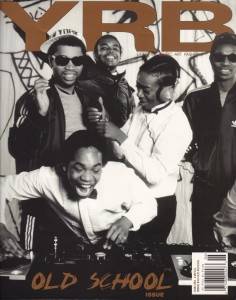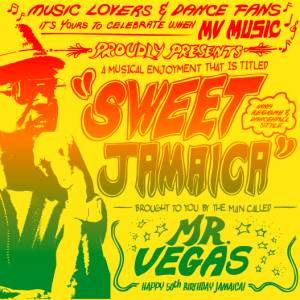
Dancehall veteran Mr. Vegas.
Nothing beats a good ol’ fashioned tale of triumph over adversity. Take the story of a certain recording star whose budding career was nearly derailed after a terrible incident. His jaw was wired shut. But instead of following his doctor’s strict orders of bed rest, the artist entered a recording studio and produced an instant classic. The rest is history.
Sounds familiar, doesn’t it? But if you’re imagining Kanye West rapping through the wire, then think again. This is the life and times of Clifford Smith, better known as Mr. Vegas.
In 1997, Vegas was an aspiring reggae singer in his hometown of Kingston, Jamaica. His speciality was dubbing over classic R&B standards like Roberta Flack’s “Killing Me Softly.” While laying down vocals at a studio one afternoon, the session abruptly ended when another musician burst in and accused Vegas of stealing a DAT tape. “I didn’t know what he was talking about, so I turned around,” recalls Vegas. But things quickly escalated. And before Vegas knew what hit him, an iron bar had busted his jaw.
Vegas braced for months of recuperation and boredom. At least, that was the plan. “I was listening to the radio when I heard Beenie Man on this hot riddim. I knew I had to get back in de studio,” recalls Vegas. The song was the sizzling dancehall hit “Who Am I?”
After having his jaw unwired mere weeks after the attack, Vegas used the track to record “Nike Air,” courtesy of producer Jeremy Harding. “Man, I was singin’ through my teeth. But I had to experiment with my style,” he says.
The gamble paid off – not only did Vegas craft an infectious hit, but discovered his niche as a singjay. That’s how you describe someone whose music combines the sweet melody of Barrington Levy and the steady, rat-a-tat flow of a Beenie Man.

Mr. Vegas’ album “Pull Up” was released in 2004.
“I bring a lot of energy to everything I do,” says Vegas. “Chattin’ works well for me, but I also like to sing. Whenever you sing a great tune, especially for the ladies – it lasts forever.”
And while he cherishes the persona of the smooth-talking ladies man, he’s smart enough to know that longevity in dancehall also requires respect from the rude bwoys. In this arena, originality counts. It’s a lesson Mr. Vegas learned after his attention-grabbing antics gave him the spotlight long before he ever took the stage.
“Growing up, I used to play football wearing pink shorts, and one of my cousins used to call me, ‘Vegas’ because it reminded him of the go-go dancers in Las Vegas,” he says with a laugh.
But the moniker stuck after he converted the Oberlin High cafeteria into a stage, American Idol style, to sing for fellow students. “I felt like I was born to sing. I knew I had the talent, so I just had to go out there and prove myself,” he says. That feeling of destiny led Vegas to haunt the studios, where the initial response was lukewarm. But he remained persistent and eventually teamed up with producer Danny Brownie.
As he perfected his singjay technique, Vegas took the world by storm with “Heads High.” The tune, with that insatiable hook, tells women to respect themselves (Heads High / Kill dem wit it now / Mek a bwoy know yuh ah no pappyshow / Heads High / Kill dem wit’ it now……Tell dem Vegas say so.”)
It soared the Billboard charts, became a must-have for DJs worldwide, and remains the ultimate party-starter. The debut album of the same name, released in 1998, won rave reviews and established Vegas as Jamaica’s newest don.

Since then, Vegas has collaborated with the likes of Bounty Killer, DMX and Elephant Man. Even the legendary Marvel Comics scribe Stan Lee sought the Vegas touch and tapped him to create the theme for a since-shuttered website. Yet no alliance proved more lucrative than his pairing with the reigning king of dancehall – Sean Paul.
Their smash-hit, “Hot Gal Today,” which first introduced the world to Paul, was featured on Vegas’ 2001 release, Damn Right. While rooted in dancehall, the album also dabbled in rock – a journey many Heads High fans did not seem willing to take.
Vegas was also panned for songs like “She’s A Ho,” which left some wondering why this silky-voiced crooner didn’t leave the slackness for the wannabe thugs. “Music is music,” he says. “I love my fans and they’re de reason I’m here. But other people – dem jus’ like to say negative ‘tings for no reason. If you say, ‘Vegas is dis or Vegas is dat,’ then yuh haffi back it up.”
With the ink barely dry on a three-album deal with the L.A.-based Delicious Vinyl Records, Vegas wants to put any lingering doubts to rest with his latest project, Pull Up.
And with the additional financial muscle of Geffen Records behind the project, he’s on the verge of entering the mainstream mix. “This is my best work,” he says excitedly. “I really think I have matured as an artist. I only wish ‘Heads High’ was on it, but it’s still hot!”
The lead single “Pull Up” is already scorching the streets with the hand-clapping Diwali riddim that’s all the rage. And with Vegas’ syrupy tenor over the albums Eastern-flavored production, Pull Up is bound to have more sure-fire hits. Besides the party tracks, Vegas spits fiyah on “Badman” and sings sweet-nothings to Foxy Brown, who guests on “Thank You Girl.”
A completely different note is struck on “Sensi” (another word for marijuana if you still aren’t familiar with Jamaican patois) where Vegas decries cocaine abuse. At first glance, this might seem like a curious topic for Vegas to tackle given his lighthearted rep.
But he hopes that his anti-drug stance (a recurring theme on his albums) will resonate with listeners, even if it’s unlikely to receive the promotional buzz of his current single.
“When you have a song that says, ‘Don’t do dis or don’t do dat, the labels may not want to market it because they don’t think de people want to hear it,” says Vegas. “But I still slip it in because I’ve seen the terrible tings that can happen to people addicted to crack or cocaine.”

Mr. Vegas’ album “Sweet Jamaica,” marking 50 years of Jamaica’s independence was released in 2012.
Noticeably absent from Pull Up is Vegas’ partner-in-rhyme, Sean Paul. Back in 2000, controversy erupted when the promotional blitz for the “Hot Gal Today” remix only highlighted Paul.
And while Vegas has nothing but love for Paul, he blames the industry for their separation: “Sometimes, labels and managers try to get in de way of a friendship and ruin a good vibe. Everywhere I go, people ask when are we gonna do somethin’ again – so we’ll see what happens.”
Dancehall’s global explosion is altering the pop music landscape. But it’s happened before. Remember the early ’90s when Shabba Ranks, Patra and Super Cat emerged only to disappear before the party really started? Yet things are different this time around as artists take a cue from the Sean Paul playbook.
In short, you don’t have to compromise your artistic soul to win over MTV. “I think people appreciate music for what it is. But even if dey don’t understand everything, I try to write in a way where dey can still sing along, even if it’s only for a few words,” says Vegas.
These days, Vegas is on the road – touring, making the promotional rounds, and being an ambassador. “It’s not about sitting in Jamaica with all de girls flossin’,” he says. “Nobody could touch Bob Marley because he traveled all over de world with his music and touched a lot of hearts. Yuh could never compare this to Bob Marley, but we’re gonna keep growing, try to make dancehall larger than ever.”
This appeared in YRB Magazine, published in May 2004.

Add Comment